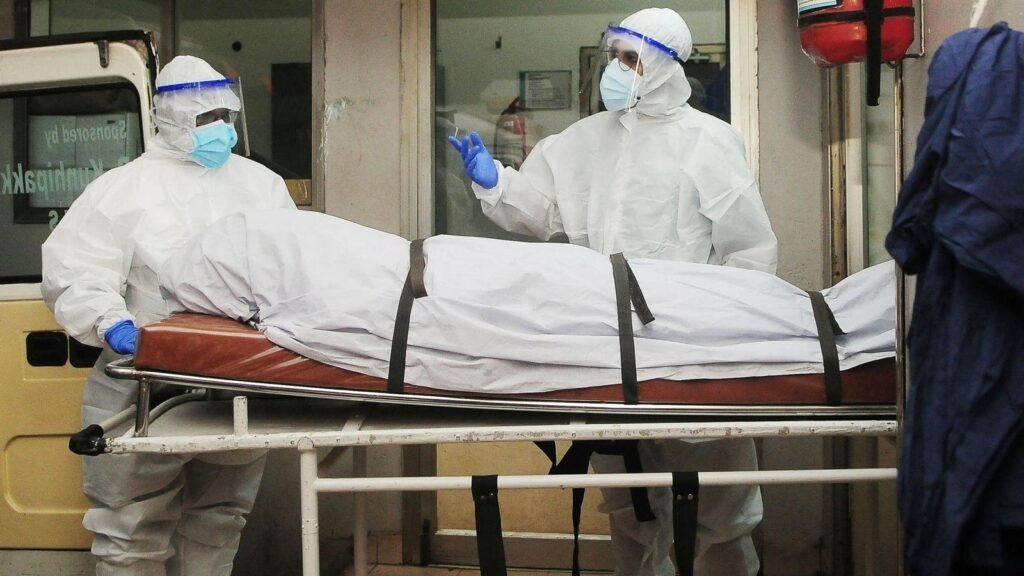Top Line
Indian health officials are rushing to contain an outbreak of the incurable Nipah virus after a teenager died over the weekend, the latest in a series of outbreaks in the region that have killed up to three in four people infected and sparked warnings it could spark a new pandemic.
Medical workers in protective gear remove the body of a person who died from the Nipah virus.
Key Facts
Nipah virus is a rare and potentially deadly virus that was first discovered after an outbreak among pig and hog farmers in Malaysia and Singapore in 1999.
Nipah virus is a zoonotic virus, meaning it can be transmitted from animals to humans, through direct contact with infected animals or their bodily fluids, or by eating contaminated foods, such as fruit products, that have been contaminated with the urine or saliva of infected bats.
In previous outbreaks, there have been reported cases of person-to-person transmission of the Nipah virus, especially among family members and caregivers of infected people.
In humans, symptoms usually appear within a few days to two weeks after infection, according to the World Health Organization (WHO), but a period of 45 days has been reported, during which humans may be contagious. (The WHO has said that pigs are “highly contagious” during this incubation period.)
Symptoms of Nipah virus usually begin with signs of respiratory illness such as fever, headache and cough and then rapidly worsen to include brain swelling (encephalitis), seizures and coma within a day or two.
Health officials estimate that between 40% and 75% of people infected with Nipah virus will die from the virus, although the exact percentage depends on the outbreak and the strength of local health systems to control the disease. (Long-term neurological symptoms, including seizures and personality changes, have been reported among people who recover from encephalitis.)
News Peg
Health authorities in the southern Indian state of Kerala are rushing to trace and identify contacts of a 14-year-old boy who died of Nipah virus on Sunday. State officials said they are tracking more than 350 people who may be at risk of infection, of which 101 are considered “high-risk” contacts and six are showing symptoms of Nipah virus. A significant portion of these contacts, about 70, are health care workers who came into contact with the boy. Kerala is considered one of the highest-risk areas for Nipah virus in the world, and this is the fifth outbreak in the state since 2018. Experts have warned that the region may be particularly at risk from the virus spilling over because of the destruction of natural habitats of bats in the region by humans.
Amazing facts
The Nipah virus was partly the inspiration for Steven Soderbergh’s Hollywood film “Contagion.” The 2011 film, starring an all-star cast including Matt Damon, Laurence Fishburne, Jude Law, Gwyneth Paltrow and Kate Winslet, was widely praised for its portrayal of the science and disease control process against the backdrop of a fictional, deadly viral pandemic.
Main Background
Fruit bats, also known as flying foxes, are the natural host of the Nipah virus. The Nipah virus belongs to the same virus group as many pathogens known to cause disease in humans, such as measles and mumps. Although fruit bats do not appear to cause any noticeable illness, the virus is known to infect a wide range of hosts, including humans, pigs, sheep, goats, horses, cats, and dogs, and past outbreaks have been documented to cause severe illness in at least humans and pigs. Its ability to infect a wide range of hosts can make it difficult for public health experts to track and contain the spread of the virus. Outbreaks of the Nipah virus have been reported in Bangladesh and India, the main locations where the disease has been recorded since 2001, as well as Malaysia, the Philippines, and Singapore. According to the WHO, approximately 600 Nipah virus cases were reported between 1998 and 2015.
How can Nipah virus infection be prevented and treated?
There are no drugs or vaccines approved for use against Nipah virus in humans or animals. Treatment for infected individuals is limited to supportive care and managing specific symptoms when they appear. Immunotherapy using monoclonal antibodies is in early stages of clinical trials, according to the Centers for Disease Control and Prevention. Remdesivir, an antiviral drug already used in humans to treat other illnesses, was also effective in animal studies when given after exposure to the virus, according to the CDC. A vaccine for Hendra virus, a close relative of Nipah virus, is available for horses in Australia and appears to provide some protection against Nipah virus infection.
Points to note
Researchers are actively working on developing treatments and vaccines for the Nipah virus. Earlier this month, the Coalition for Epidemic Preparedness Innovations announced plans to begin clinical trials of a monoclonal antibody to protect against Nipah virus infection early next year. The antibody works by binding to the virus and blocking it from infecting cells. In January, researchers began clinical trials of a potential first Nipah virus vaccine. The experimental vaccine is being developed by the University of Oxford’s Institute of Pandemic Science. The vaccine uses the same viral vector technology as the COVID-19 vaccine the institute developed in collaboration with pharmaceutical giant AstraZeneca.
Receive Forbes Breaking News Text Alerts: Start a text message alert and stay on top of the biggest stories making headlines that day. Text “Alerts” to (201) 335-0739 or sign up now. here.
References
Disease X: A 100-Day Mission to End the Pandemic by Kate Kelland




